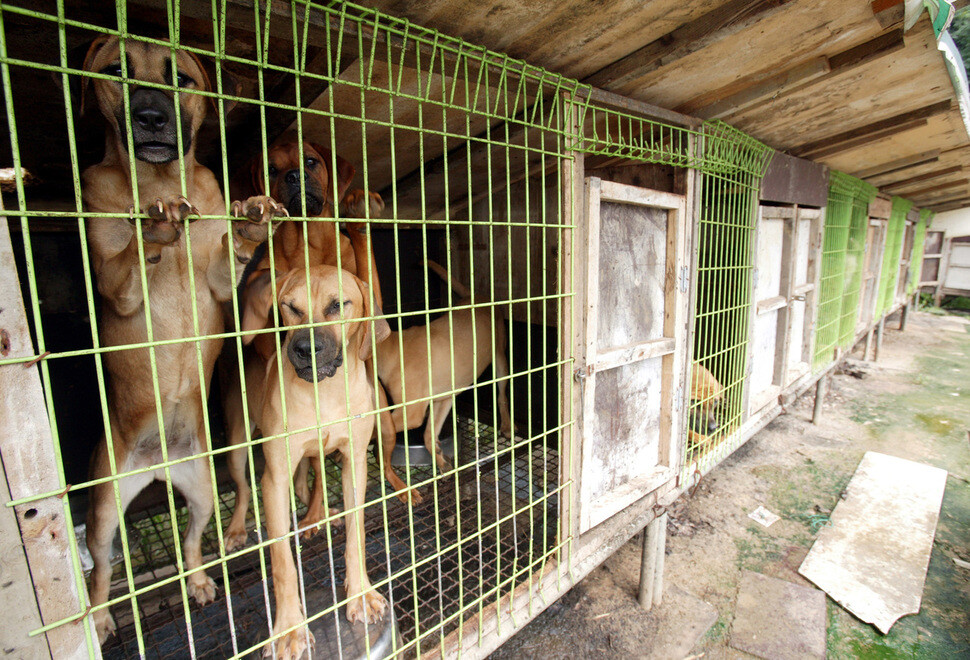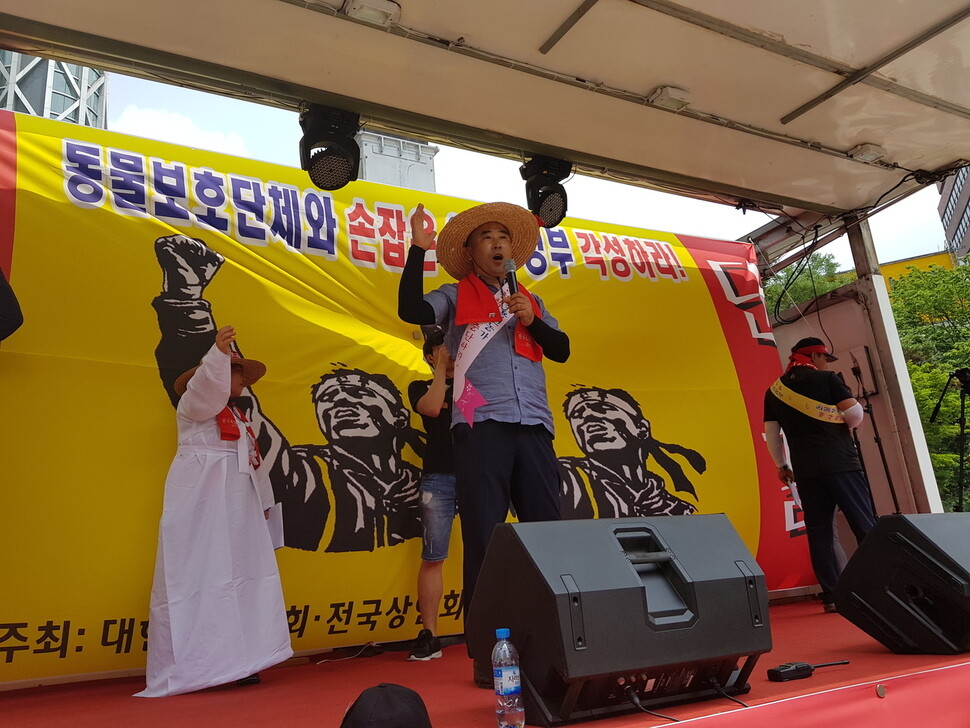hankyoreh
Links to other country sites 다른 나라 사이트 링크
South Korea’s debate over dog meat consumption flaring up again

“There would be an uproar if you just let 10 dogs free on the Cheonggye Stream,” said one of the marchers in the “The Rally to Defend the Livelihood of 1 Million Dog Farmers,” which was held in downtown Seoul on the afternoon of July 6. The joke was echoed by other people walking above Mojeong Bridge at Jongno 1-ga Street in Seoul, as they were soaked by a sudden downpour.
“The media and the government are in cahoots with animal rights groups, and it’s time for them to wake up! Let‘s wipe them out,” the protesters chanted, after listing the names of 13 animal rights groups, one after the other.

The marchers were filled with rage. Coordinating the rally and leading the chanting was Ju Yeong-bong, chief of strategy for the Association of Korean Dog Farming Organizations. Three years before, Ju had tried to set up a farm that could raise between 700 and 800 dogs in Damyang, South Jeolla Province, but his efforts were blocked by opposition from a neighbor. During the four months when civic petitions were being filed, his farming license expired. Ju blames it all on a neighbor who lived overseas for a long time and is an animal rights activist. He also thinks that a single person could not have fought so long if it weren’t for the animal rights groups. “I got into dog farming so that I could make a living, and I don’t have anything left,” he said.
On South Korea’s first dog day on July 12 (a summer day when dog meat is traditionally eaten), the dog meat shops in Gyeongdong Market, in the Jegi neighborhood of Seoul’s Dongdaemun District, were empty. “We’ve been fighting with animal rights groups that have interfered with our business,” said “K,” who has been selling dog meat for six years now. “Since there are more protests and public opposition, we’re victims, too,” “K” said, noting that there are fewer customers these days.

On July 9, animal rights groups organized a demonstration against eating dog meat called “Stop It! Stop Eating,” which was held at Seoul Plaza in front of City Hall. Over 300 people marched through the rain downtown, holding pickets expressing their opposition to eating dog meat.
“Help us!”
“Yank on the rope in front of you as you pray for the freedom of the dogs that are behind bars.”

As the people at the demonstration pulled on the rope, the bars snapped and the trapped dogs ran out. The dogs that were leaping for joy were actually members of animal rights group wearing brown pants and made up to look like dogs.
Han Soon-nim, 65, who has been supporting animal rights groups for 10 years, came to the demonstration to bring this issue to public attention. “When I went to Moran Market, I saw dogs locked up in cages being dragged away and slaughtered. Dog eating needs to be done away with. That said, the government should take steps to help farmers find other occupations,” Han said.
Opposition to eating dog has recently shifted from campaigns and advertisements to direct action. On July 12, animal rights group Coexistence of Animal Rights on Earth (CARE) asked Prosecutors to investigate 15 owners and employees at shops at Jungang Market in Seoul and at Moran Market in Seongnam, Gyeonggi Province for violating the Animal Protection Act. This summer, the Association of Leaders of Animal-Related Groups parked a recreational vehicle in Seoul’s Gyeongdong Market to provide room and board for people who are monitoring and patrolling illegal activity related to eating dog meat. “They say a lot of progress has been made, but they‘re still being slaughtered and sold in Gyeongdong Market. The District Office is cracking down on it, but people go undercover to avoid getting caught,” said Jo So-yeong, an activist with the Korean Animal Welfare Association.
During the debate over eating dog, which has continued for decades now, a considerable number of people who think that it’s okay to eat dogs have held to the perspective of cultural relativism. They say that this is a unique Korean tradition that should be understood and that Koreans should free themselves from slavish and uncritical adoption of foreign culture.
Previous blowups about the dog eating issue are remembered by many as a humiliation of the Korean people by outside forces. The government tried to patch over the issue when the country was in the global spotlight before the Seoul Olympics in 1988 by forcibly relocating dog meat restaurants from the main streets into the back alleys, and French actress Brigitte Bardot bashed dog-eating Koreans as “barbarians.”

But given an increasing support for people’s right to life, a negative view of dog-eating culture has been forming. Hardly any articles are printed in support of eating dog meat, compared to the flood of articles condemning the practice. According to a 2000 article in the journal of the Korea Society of Food and Nutrition titled “Koreans’ Attitudes Toward Eating Dog Meat” by Ahn Yong-geun, a professor of food and nutrition at Chung Cheong University, 86.3%, or 1,171, of 1,502 Chung Cheong University students and their friends supported eating dog, while only 13.7%, or 186, opposed it. When asked why they supported eating dog meat, respondents (who were allowed to choose multiple answers) said that other countries shouldn‘t take issue with Korea’s unique food culture (753), that dog meat tastes good (561), that it’s good for your health (470) and that they were frustrated with Western cultural chauvinism (429).
The results of a Gallup poll carried out in 2015, 15 years later, are quite different. Just 37% of 1,005 adults (19 and older) around South Korea had a positive view of eating dog meat, while 44% viewed it negatively and 19% declined to respond or were not sure. While a direct comparison would be dubious because of differences in the format of the questions and the people surveyed, it’s clear that attitudes toward dog meat have changed greatly. With fewer people buying dog meat, the price of a “geun” (600 grams) of dog meat has fallen by more than 50% over the past few years, to 2,500-3,000 won.
Ultimately, these changes are producing a yearly cultural clash between opponents of eating dog meat and the cultural relativists who continue to eat it without any guilt, experts say. “People used to sweep domestic violence under the rug, saying that it was a family matter and should be left to families. The mood in society has changed, and now people take outside intervention for granted. The dog meat issue has also been tolerated as a tradition until now, but in the future, this tradition will go away. We’ve passed the transitional phase, and it’s time to find an answer,” said Park Hang-ju, secretary for Lee Jung-mi, a lawmaker with the Justice Party.
Both dog farmers and animal rights advocates want the current reality to be changed. Dog farmers argue that their trade should be legalized and that the dog meat industry should be formally recognized like other livestock industries. Animal rights advocates want farming and eating dogs to be outlawed.
There are challenges in store for both of these courses of action. “Making a law to legalize this would have to be backed by social consensus, but that wouldn’t be easy because the number of people eating dog meat is declining noticeably,” said Ham Tae-seong, a professor in the law school at Kangwon National University. At the same time, “for animal rights groups’ campaigning to get results, there would need to be legal precedent of a court ruling that the slaughter of dogs violates the Animal Protection Act, but that hasn‘t happened yet.”

As the tension moves toward the breaking point, the government continues to sit on its hands. On July 13, the Ministry of Agriculture, Food and Rural Affairs said that it would “follow public opinion” in regard to eating dog meat, but it did not offer any specific position. As the same situation plays out each year, the Ministry’s position has been that it will take action if it hears from the Blue House or the Office of the Prime Minister. The Ministry of Food and Drug Safety, which is responsible for managing hygiene, flatly stated on July 12 that “it had not carried out any inspection of the dog meat that is circulating on the market because it is not a food product.” Since dogs and dog meat were excluded from livestock and livestock products by the revision of the Livestock Product Processing and Handling Act (currently the Livestock Product Hygiene Maintenance Act) in 1978, dog meat has become a food that only exists in the shadows. Dog meat has been left alone for nearly 40 years as an unsolvable problem, but perhaps the time has come to finally tackle it.
By Choi Woo-ri, staff reporter
Please direct questions or comments to [english@hani.co.kr]

Editorial・opinion
![[Guest essay] The real reason Korea’s new right wants to dub Rhee a founding father [Guest essay] The real reason Korea’s new right wants to dub Rhee a founding father](https://flexible.img.hani.co.kr/flexible/normal/500/300/imgdb/original/2024/0423/8317138574257878.jpg) [Guest essay] The real reason Korea’s new right wants to dub Rhee a founding father
[Guest essay] The real reason Korea’s new right wants to dub Rhee a founding father![[Column] ‘Choson’: Is it time we start referring to N. Korea in its own terms? [Column] ‘Choson’: Is it time we start referring to N. Korea in its own terms?](https://flexible.img.hani.co.kr/flexible/normal/500/300/imgdb/original/2024/0423/3617138579390322.jpg) [Column] ‘Choson’: Is it time we start referring to N. Korea in its own terms?
[Column] ‘Choson’: Is it time we start referring to N. Korea in its own terms?- [Editorial] Japan’s rewriting of history with Korea has gone too far
- [Column] The president’s questionable capacity for dialogue
- [Column] Are chaebol firms just pizza pies for families to divvy up as they please?
- [Column] Has Korea, too, crossed the Rubicon on China?
- [Correspondent’s column] In Japan’s alliance with US, echoes of its past alliances with UK
- [Editorial] Does Yoon think the Korean public is wrong?
- [Editorial] As it bolsters its alliance with US, Japan must be accountable for past
- [Guest essay] Amending the Constitution is Yoon’s key to leaving office in public’s good graces
Most viewed articles
- 1[Column] ‘Choson’: Is it time we start referring to N. Korea in its own terms?
- 2Senior doctors cut hours, prepare to resign as government refuses to scrap medical reform plan
- 3[Guest essay] The real reason Korea’s new right wants to dub Rhee a founding father
- 4Why Korea shouldn’t welcome Japan’s newly beefed up defense cooperation with US
- 5Opposition calls Yoon’s chief of staff appointment a ‘slap in the face’
- 6New AI-based translation tools make their way into everyday life in Korea
- 7Terry Anderson, AP reporter who informed world of massacre in Gwangju, dies at 76
- 8[Column] The clock is ticking for Korea’s first lady
- 9Samsung barricades office as unionized workers strike for better conditions
- 10Korean government’s compromise plan for medical reform swiftly rejected by doctors